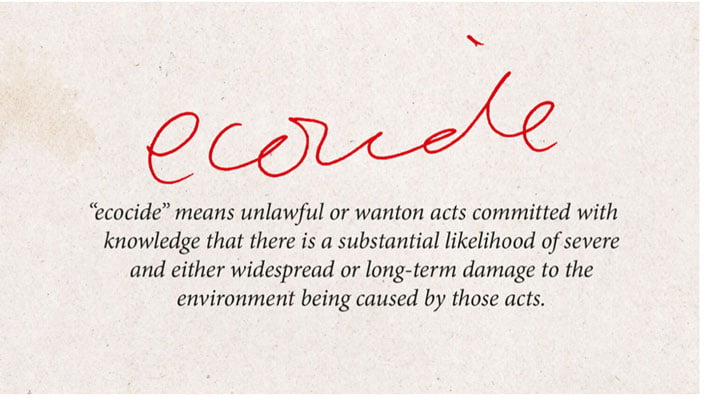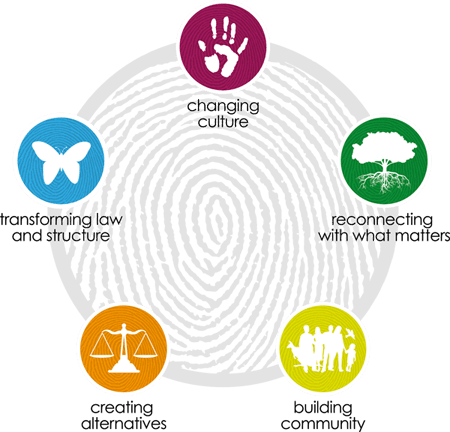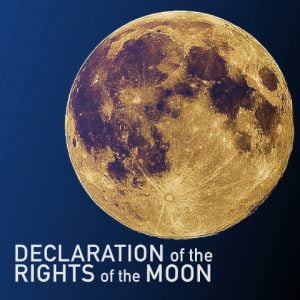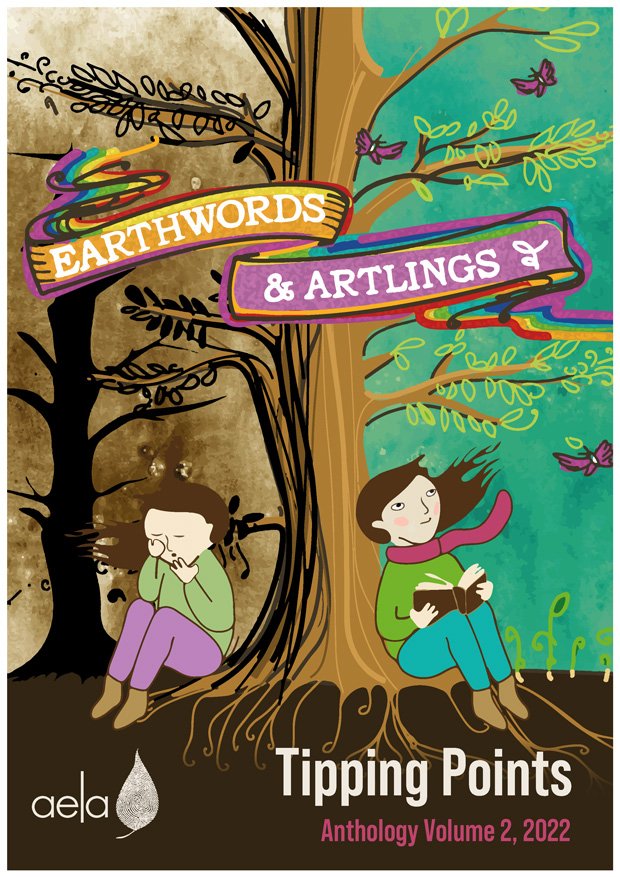This blog will explore Stop Ecocide International and the Independent Expert Panel for the Legal Definition of Ecocide.
Stop Ecocide International
Stop Ecocide International (SEI) was co-founded in 2017 by pioneering barrister Polly Higgins (1968-2019) and current Executive Director Jojo Mehta.[1] SEI promotes and facilitates steps towards making ecocide a crime at the International Criminal Court (ICC) in order to prevent devastation of nature and so protect the future of life on Earth.
SEI has an expanding network of communication teams around the globe, and websites in multiple languages. A growing number of ICC member states[2] (as well as the Pope and the EU) have publicly expressed interest in an international crime of ecocide.[3] In December 2019 both the Maldives and Vanuatu called for an amendment to the Rome Statute to include Ecocide as an international crime.[4]

Independent Expert Panel for the Legal Definition of Ecocide
In November 2020, the Stop Ecocide Foundation convened the Independent Expert Panel for the Legal Definition of Ecocide on the request of interested parliamentarians from the governing parties in Sweden. It comprised 12 lawyers from around the world, with a balance of backgrounds, and expertise in criminal, environmental and climate law. They were charged with preparing a practical and effective definition of the crime of ‘ecocide’ which could sit alongside Genocide, Crimes Against Humanity, War Crimes and the Crime of Aggression in the Rome Statute of the ICC.
The Panel was assisted by outside experts and a public consultation that brought together hundreds of ideas from legal, economic, political, youth, faith and indigenous perspectives from around the globe. All of this material fed into the panel’s deliberations over nine months. A consensus on a core text of a definition of ecocide as an international crime was reached in June 2021.[5] Ecocide was defined to mean “unlawful or wanton acts committed with knowledge that there is a substantial likelihood of severe and either widespread or long-term damage to the environment being caused by those acts.”[6]

The proposed definition creates two thresholds for prohibited conduct.
First, there must exist a substantial likelihood that the conduct (which includes an act or omission) will cause severe and either widespread or long-term damage to the environment.
The second threshold requires proof that the acts or omissions was either unlawful or wanton. This additional threshold draws upon environmental law principles, which balance social and economic benefits with environmental harms through the concept of sustainable development. With these two thresholds, the prosecution would need to prove a substantial likelihood of causing severe and either widespread or long-term damage through acts or omissions that are either unlawful or wanton.[7]
“Wanton” means with reckless disregard for damage which would be clearly excessive in relation to the social and economic benefits anticipated. The word “wanton” introduces a proportionality test which reflects environmental law principles. That is, it would be a requirement for the court to weigh the prohibited environment harm/s against the social and economic benefits, when making a determination as to whether the harm is ‘excessive’. The court is not weighing up factors of equivalence. The test of proportionality is whether or not the relevant harm caused is excessive relative to the benefit achieved. Dr Gwynn McCarrick would suggest in her interpretation of the definition that if the acts or omissions meets the threshold of severe harm then any consideration of social or economic benefit would be invalidated.
The word wanton as a qualifier in the definition would mean there are some categories of acts, whilst they might be lawful, nevertheless transgress the criminal threshold of recklessness. These are acts that bring about prohibited consequences (in this case the damage to the environment) which would be clearly excessive.
There has been a lot of talk on the international scene around the mental element for ecocide. In most criminal jurisdictions there is a requirement that the crime itself be an intentional act. Intention is a high threshold to prove – in Australian Criminal Code intention requires an awareness of a near certainty that the consequences will occur. In the environmental harm context, generally speaking corporations don’t go out with an intent to cause harm, they go out with an intent to make profit. The Panel definition recognises this and incorporates the mens rea of recklessness, requiring awareness of a substantial likelihood of severe damage as the appropriate default standard of culpability. [8]
To help support the work of AELA, our Stop Ecocide Australia branch and Ecocide Laws Australia working group please consider becoming a monthly donor.
- [1] ‘Who We are’ Stop Ecocide International (Web Page, 2021) <https://www.stopecocide.earth/who-we-are->.
- [2] ‘Leading States, Key Dates’ Stop Ecocide International (Web Page, 2021) <https://www.stopecocide.earth/leading-states>.
- [3] ‘Ecocide’ Australian Earth Laws Alliance (Web Page, 2021) <https://www.earthlaws.org.au/aelc/ecocide/>.
- [4] ‘Sovereign states call on ICC to seriously consider ecocide crime’ Stop Ecocide International (Web Page, 2019) <https://www.stopecocide.earth/newsletter-summary/sovereign-states-call-on-icc-to-seriously-consider-ecocide-crime->.
- [5] ‘Independent Expert Panel for the Legal Definition of Ecocide’ Ecocide Law (Web Page, 2021) <https://ecocidelaw.com/independent-expert-drafting-panel/>.
- [6] ‘Independent Expert Panel for the Legal Definition of Ecocide Commentary and Core Text June 2021’ Stop Ecocide Foundation (Web Page, 2021) <https://static1.squarespace.com/static/5ca2608ab914493c64ef1f6d/t/60d1e6e604fae2201d03407f/1624368879048/SE+Foundation+Commentary+and+core+text+rev+6.pdf>.
- [7] ‘Independent Expert Panel for the Legal Definition of Ecocide Commentary and Core Text June 2021’ Stop Ecocide Foundation (Web Page, 2021) <https://static1.squarespace.com/static/5ca2608ab914493c64ef1f6d/t/60d1e6e604fae2201d03407f/1624368879048/SE+Foundation+Commentary+and+core+text+rev+6.pdf>.
- [8] ‘Ecocide Laws Australia : Webinar 24 Nov 2021’ Australian Earth Laws Alliance (Web Page, 2021) <https://www.youtube.com/watch?v=rXaTJvDQ7Nk>.





















